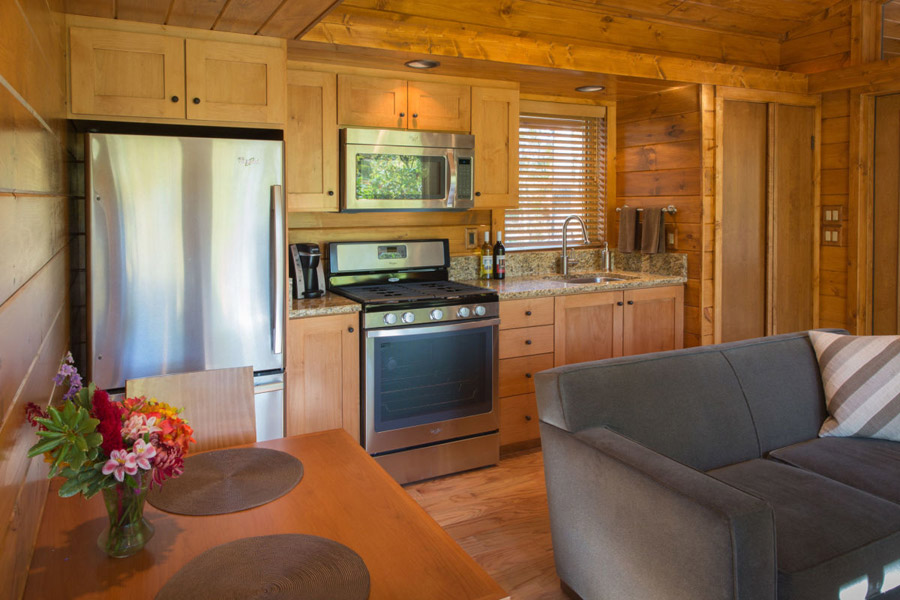The “Tiny House Movement” is great, but it’s also a failure.
It’s great that people are starting to think outside the imprisoning mortgage
and rent system, but the guise of environmental-mindedness needs to be
questioned. The total dollar savings over a foundation house is unquestionable,
but looking more closely, not only is the cost “savings” questionable, but the
utility vs. cost isn’t great.
The tiny house movement appears to be as rooted in
environmental motives as it is in protest of conventional economic norms. The
reduced size of the houses is supposed to be less resource intensive in
construction materials required, as well as less energy intensive due to less
volume of space to heat, clean, and maintain. For many of those savings, there
is a true savings to be had. But to what end and is it really saving anything?
The reason for the environmental question is that the tiny
house movement is really just creating new housing spaces. It’s not replacing,
repurposing, or improving current housing spaces; it’s creating new demand for
building products and creating more housing spaces. From a pop-enviro-culture
perspective, the creation of smaller, more efficient spaces is great. But it’s
NOT great to be creating new demand for new building products, flatbed
trailers, etc, only to create MORE housing spaces. The creation of these spaces
either leads to more room being made for others to come into empty housing
spaces and/or it leads to the abandonment of pre-existing housing areas. In
essence, the tiny house movement is just a new form of consumption and a new
pathway for population growth, which is in conflict with the core of current
problems that environmentalism is concerned with.
Tiny houses are often recognized for being a better dollar
savings over a conventional home. But are they really? Tiny houses are often
100-200 square feet, sometimes a little more. The costs I frequently see on the
internet are between $18,000 and $35,000 for construction materials. If we look
at cost per square foot, that’s $90-$350/square foot at the extremes of those
numbers. A $200,000 house with 2,000 square feet is $100/square foot. The tiny
house only solves one problem: Total cost. Dollars per square foot, tiny houses
cost as much or more than real houses.
That’s why the tiny house movement needs to move toward
recognizing RV dwelling as part of the tiny house movement. RV’s over 10 years
old have lost so much of their value, few are worth very much. My Winnebago
Brave was 14 years old when I bought it and had lost over 80% of its original
value. My 200 square foot [RV] tiny house cost only $50/square foot, which is a
tremendous savings over the cost of building a new structure and it was ready to go the moment I purchased it. Modern RV’s are
well-insulated, the electrical systems are well designed, and are
fully self-contained rolling homes.
RV’s make even better tiny houses than tiny houses, in part
because they have lost their value due to high gas prices. Not too many people
are wanting to buy gas for these beasts that get 4-8 MPG. As a tiny house, one
can park it and move it only as-needed. I only move mine in the summer around
town, then I will move it to another location once I locate employment. My gas
costs are almost non-existent. I have put 300 miles on my Winnebago since I
bought it almost two years ago.
There are fields upon fields of RV’s, rotting, waiting to be
sold. The RV is a preposterous thing to begin with, but with gas prices over
$3/gallon, they’re unsustainable for almost anyone to use recreationally. Which
is one reason the tiny house movement is preposterous. There are fields of
mobile, manufactured, tiny homes that have almost no value and represent a huge
potential savings over the construction of a new structure to live in. These
rolling, self-contained, pre-made and largely abandoned homes are a much better
answer to the problems that tiny-housers are trying to solve. The most environmentally
friendly thing one can do is to repurpose something that is unused or
underutilized, rather than construction of new places and the creation of new
demand for building products. Time for the tiny house movement to start looking
at repurposing rather than just creating new construction. Tiny houses are just
RV’s made with conventional housing products, which are heavy and require a
big, powerful truck to haul them. Tiny houses solve only one problem, but they
create all new ones.
